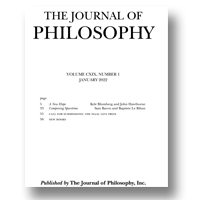|
1.
|
The Journal of Philosophy:
Volume >
115 >
Issue: 4
Marc Lange
What Would Normative Necessity Be?
abstract |
view |
rights & permissions
| cited by
Fine and Rosen have argued that normative necessity is distinct from and weaker than metaphysical necessity. The first aim of this paper is to specify what it would take for this view to be true—that is, what normative necessity (as weaker than metaphysical necessity) would have to be like. The author argues that in order for normative necessity to be weaker than metaphysical necessity, the metaphysical necessities must all be preserved under every counterfactual antecedent with which they are all collectively logically consistent—even when their preservation requires that a normative necessity fail to be preserved. By exhibiting some examples that fail to display this pattern of counterfactual invariance, the author argues against the view that normative necessity is weaker than (and perforce distinct from) metaphysical necessity. To give this argument (and to address some possible replies to it) is the second aim of this paper.
|
|
|
2.
|
The Journal of Philosophy:
Volume >
115 >
Issue: 4
Kevin J. Lande
The Perspectival Character of Perception
abstract |
view |
rights & permissions
| cited by
You can perceive things, in many respects, as they really are. For example, you can correctly see a coin as circular from most angles. Nonetheless, your perception of the world is perspectival. The coin looks different when slanted than when head-on, and there is some respect in which the slanted coin looks similar to a head-on ellipse. Many hold that perception is perspectival because you perceive certain properties that correspond to the “looks” of things. I argue that this view is misguided. I consider the two standard versions of this view. What I call the PLURALIST APPROACH fails to give a unified account of the perspectival character of perception, while what I call the PERSPECTIVAL PROPERTIES APPROACH violates central commitments of contemporary psychology. I propose instead that perception is perspectival because of the way perceptual states are structured from their parts.
|
|
|
3.
|
The Journal of Philosophy:
Volume >
115 >
Issue: 4
Mihnea D. I. Capraru
Note on the Individuation of Biological Traits
abstract |
view |
rights & permissions
| cited by
Bence Nanay has argued that we must abandon the etiological theory of teleological function because this theory explains functions and functional categories in a circular manner. Paul Griffiths argued earlier that we should retain the etiological theory and instead prevent the circularity by making etiologies independent of functional categories. Karen Neander and Alex Rosenberg reply to Nanay similarly, and argue that we should analyze functions in terms of natural selection acting not on functional categories, but merely on lineages. Nanay replies that these lineages cannot be individuated except by reference to functional categories. Worryingly, Neander and Rosenberg themselves have previously argued persuasively that homology often depends on function. This article addresses their arguments and shows how to escape them: Regardless whether the arguments are right about long-term homological categories, they do not apply to generation-to-generation homology. The latter, moreover, is sufficient for individuating the lineages needed to explain teleological functions.
|
|
